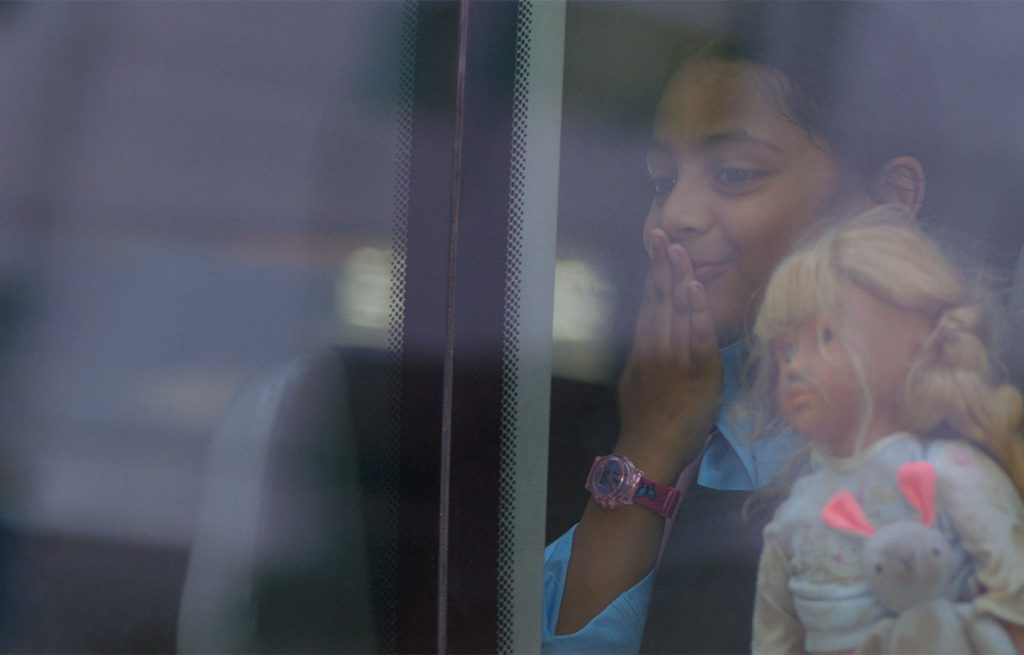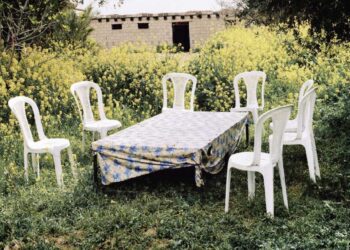Films depicting the oppressive working conditions for migrants from impoverished countries living in the Gulf, such as Aadujeevitham (Goat Life, 2024) and Gulf (2017), have been on the rise in recent years. But what Wendy Bednarz’s acclaimed debut film brings to cinema is a further, unexplored topic which has received relatively little coverage in international cinema: the further implications of an unjust system for immigrant family life.
Yellow Bus opens on a joyful morning in Ananda (Tannishtha Chatterjee) and Gagan (Amit Sial)’s small apartment, set in an unnamed, hot and dusty city in the Gulf. The morning routine resembles that of everyday: mother Ananda prepares breakfast and lunch boxes, father Gagan gets ready for work on the construction site, while daughters Ravina (Aarushi Laud) and Anju (Kshethra Mithun) prepare for yet another day at school, at the renowned Al-Ameer Academy, a beacon for future economic emancipation. The Indian family moved to the Gulf before the girls were born, searching for better life prospects and economic stability. All seems perfectly in order and the family displays scenes of an idyllic, harmonious life.
Ananda sees her daughters off as the school yellow bus comes to collect them. Soon after, however, she receives a fatidic phone call from the school administration announcing the tragic turn of events: Anju, who had fallen asleep during the ride, has been left to suffocate to death in the blistering, boiling bus, parked for hours under the midday scorching sun. The school headmistress hastily places all blames on the Pakistani driver and the Filipina bus attendant, which, as she reports, have been promptly dismissed. She hastens to bury the accident, offering compensation money to Ananda, which the latter refuses.

Here, a tension between Gagan and Ananda arises. While the father is keen to stoically accept his fate and carry on with life, Ananda’s search for truth and accountability becomes unquenchable. Her own investigation on the case progressively reveals the intricacies of a rotten system capitalising on neo-liberal values, on the exploitation of cheap, disposable labour, and a discriminate or non-existent judiciary system. Gagan is very much aware of his vulnerable position as an Indian construction site manager in the Gulf, one whose residency and thus livelihood is incumbent on being submissive to the system. Ananda, on the other hand, embodies the undefeated mother’s relentless fight for justice and accountability. Her refusal, from the onset, to accept the official narrative of a series of negligence and mishaps and to submit to her humble position of a powerless immigrant woman eventually brings about a sense of justice.
Bednarz’s award-winning modern-day thriller sheds light on an all-too common series of tragic events which afflict the underground, vulnerable working force of the Gulf, for whom the cost of justice often represents too high of a price to be pursued. It further weaves the portrait of the universal, staunch mother figure -superbly acted by Tannishtha Chatterjee- in the face of brutal, yet avoidable plights.








